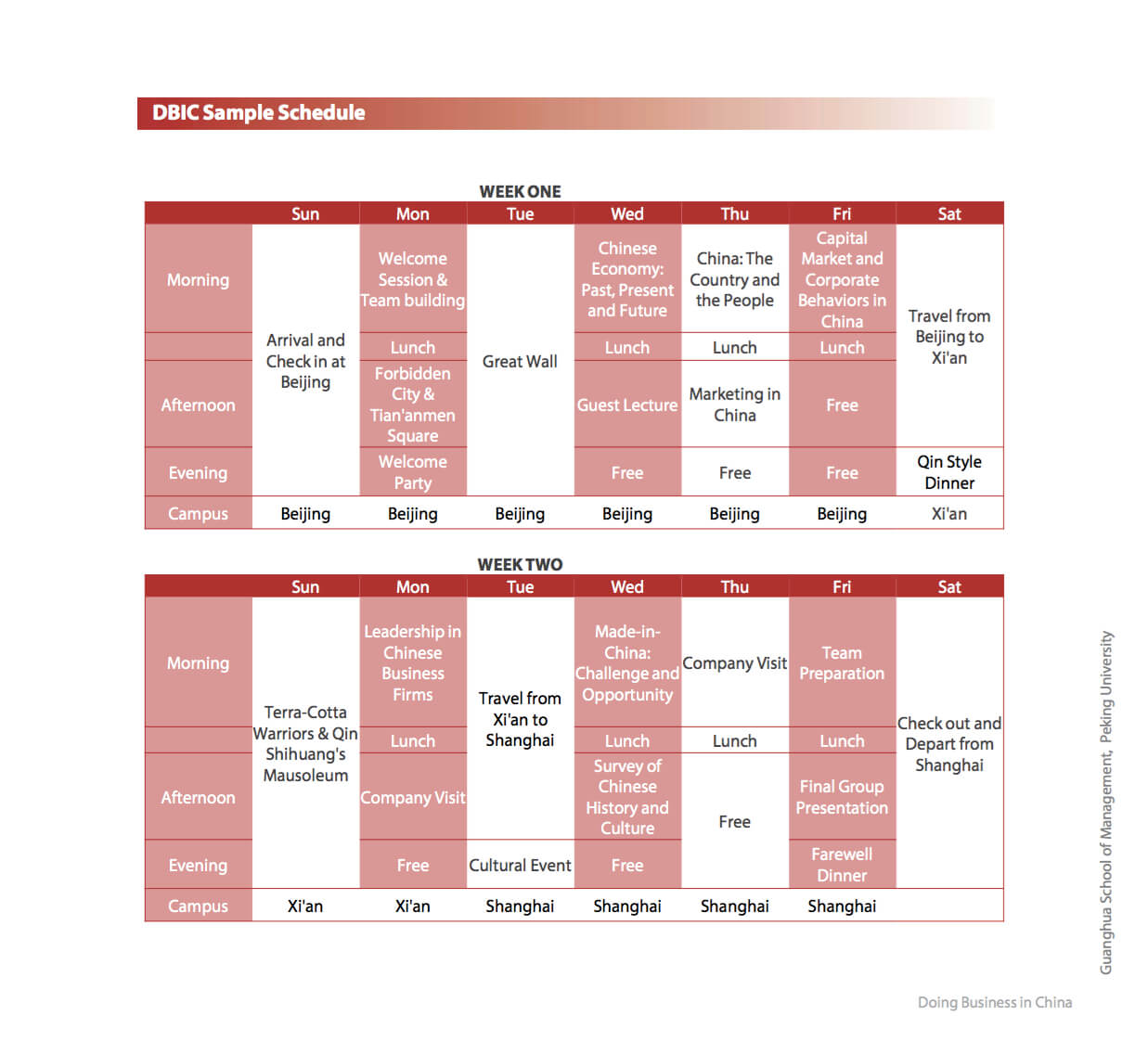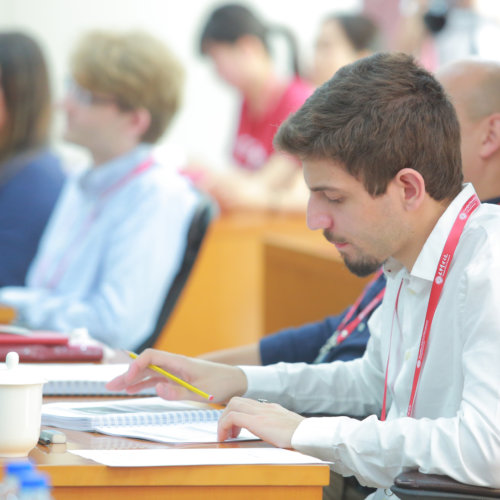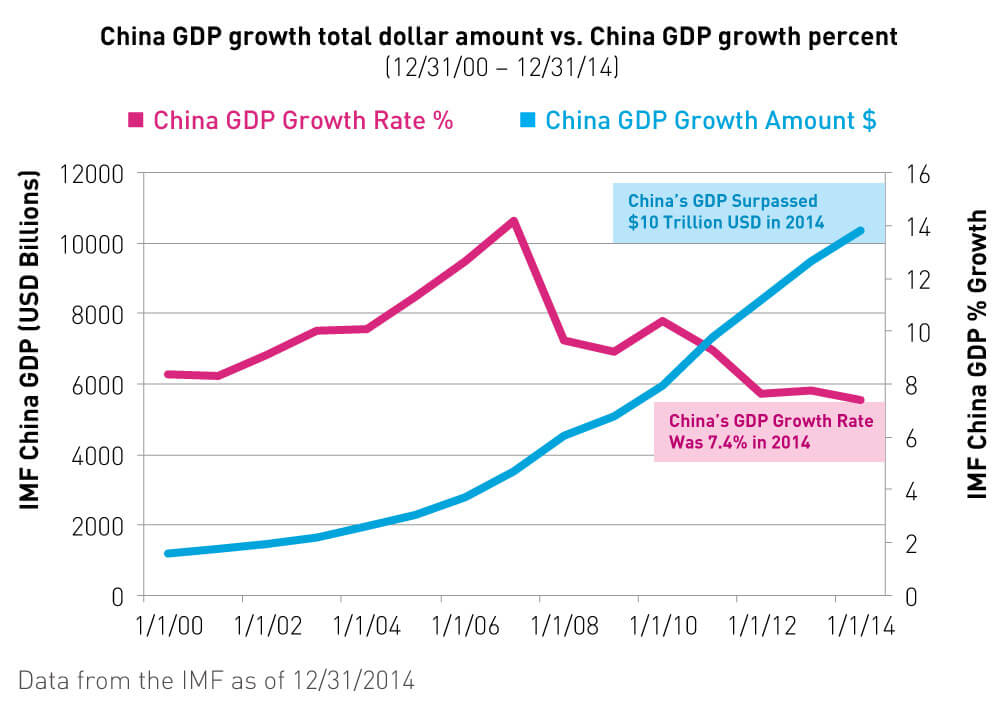
Renowned professors
15+ years of experience
3000+ Participants
120+ global partner institutes
3+ Guanghua campuses
Why DBIC
As China continues to play a prominent role in international business, understanding how to conduct business in China is no longer an added-value to your CV, but rather a prerequisite to success. Yet, few business students and, even senior professionals, actually understand China. The DBIC program provides students with the critical and essential tools to understanding how to do business in China through a combination of subject-specific modules, company visits, and cultural activities. Through merging both “classroom knowledge” with real business practices, students are able to understand China beyond the rapid economic growth. Students who attend the DBIC program not only take part in an unforgettable experience but also gain skills that will equip them for global success.
Featured Courses of China’s Economy and Business
Demographics and Long-run Economic Growth: The Case of China
China’s unexpected economic boom in the past three decades has dwarfed the rest of the world. It has been crowned as the world’s second-largest economy since 2010. In this lecture, we first review basic economics theories on why and how a country can achieve long-run sustainable economic growth. Then utilize these frameworks to explain China’s rise in a global context, describes its unique development path from a central-planned regime to a market economy, and provides useful insights into the driving forces behind China’s remarkable economic achievements. Special attention will be paid to the political economy and institutional aspects of China’s transition. Problems associated with the current economic reforms and potential challenges China will be facing in the near future will be addressed in the end.
China: Historical Legacy and Current Institutional Context
An adequate understanding of the institutional contexts is crucial for business success in China. This module will focus on key aspects of the institutions that have profound impacts on firms’ strategy and development. Through this module, you will understand why Chinese local states behave in certain ways, and how complex horizontal and vertical inter-governmental relations promote China’s economic prosperity. You will have a better understanding on how government-firm relationships, the fiscal reforms, different types of ownerships, household registration system, and various social organizations constrain or facilitate the free flow of production factors.
Marketing in China
Business marketing phenomena occur with all transactions, exchanges and relationships between any dyad involving organizations, institutions or resellers and, within / among social networks. This course focuses on the distribution channel in B2B markets. Channel is one of the four Ps of the marketing mix, providing many essential services to end-customers that the firm cannot efficiently provide itself. But, the distribution channel is not just a conduit through which the firm reaches its end market. The channel members are customers in their own right, with their own needs. Further, they market not only the firm’s products but also competitors’ products and, increasingly, their own private label products. Thus, channel members are conduit, customer, and competitor rolled into one, and their motivations and objectives are often not aligned with those of the firm.
Capital Market in China
Currently, China’s stock market is an important channel of financing for Chinese enterprises as well as an important tool to diversify portfolios for international investors. In this module, we will discuss the features of China’s stock market that are fundamental different from international stock markets and through this introduction, assist class participants in understanding stock investing in China. We will also discuss some corporate behaviors, particularly the behaviors of foreign firms or joint ventures, which are the consequences of coping with China’s unique investment environments.
Made-in-China: Challenges and Opportunities
This module is designed to expose the students to the history and status quo of the manufacturing industry in China, as well as the opportunities and challenges faced by Chinese manufacturing companies in such a dynamic environment of China. Through a series of in-class mini-case discussions and value chain analysis, students will learn the strategies Chinese manufacturing companies took to move up the value chain. Students will also be exposed to various strategies Chinese leading manufacturing companies are undertaking to expand their business into the global market.
Meet Our Instructors

Dr. Rui Wang is currently an Associate Professor of Marketing at Guanghua School of Management. She obtained her Ph.D. in marketing from Pennsylvania State University in 2008. Prof. Wang’s research interests are mainly in strategic marketing areas such as B2B marketing, marketing leadership, social networks, interfirm relationships. Her research papers have appeared in the leading international journals, such as Strategic Management Journal, Journal of Business-to-Business Marketing, Chief Marketing Officer Journal.
Prof. Rui Wang
Department of Marketing

Dr. Yanlong Zhang is an Associate Professor at Guanghua School of Management at Peking University. He received his Ph.D. in Sociology from Duke University. His research interests include economic sociology, organization studies, social networks, and social capital. His recent research on Chinese land banking, household finance, development of management literature, and corporate social capital was published in Management and Organization Review, Social Networks, Academy of Management Annals, and Research in the Sociology of Work. His current research studies entrepreneurs’ social networks, local business associations, and corporate social capital.
Prof. Yanlong Zhang
Department of Organization and Strategic Management

Dr. Hui Wang is an Associate Professor of Applied Economics at the Guanghua School of Management, Peking University. He is the associate director and research fellow of the Institute for Economic Policy Research of Peking University (IEPR-PKU). Dr. Hui Wang holds a Ph.D. and Master degree in Economics from the University of Toronto. His research interests include Industrial organization, Labour economics, Economic development, and Applied econometrics. His teaching includes Managerial Economics, Chinese Economy, Principles of Economics, Advanced Microeconomics, and other professional training courses. His Research Areas are Industrial organization, Labour economics, Economic development and Applied econometrics.
Prof. Hui Wang
Department of Applied Economics

Dr. Longkai Zhao is an Associate Professor of Finance and the Associate Director of MBA Programs at Guanghua School of Management. He received his Ph.D. in Finance from the University of British Columbia, Vancouver, Canada, in 2005. Dr. Zhao’s research interests include behavior finance, empirical corporate finance, investments, and international finance. His research works have appeared in Journal of International Business Studies, Journal of Banking and Finance, Journal of Comparative Economics, etc…He is a CFA charter holder and member of the CFA committee board in China.
Prof. Longkai Zhao
Department of Finance

Dr. Xin Zhai is an Associate Professor of the Department of Management Science and Information Systems. She obtained her dual bachelor degrees and master degree from Tsinghua University, and her Ph.D. degree in Operations Management from Purdue University in 2006. Professor Zhai’s research interests include operations management, supply chain management, and production strategy. Currently, Professor Zhai teaches the MBA/IMBA core course ‘Operations Management’ and an elective course ‘Project Management’ at GSM.
Prof. Xin Zhai
Department of Management Science and Information Systems
Photo Gallery
The program gives students an overview of doing business in China through Academic Modules, Company Visits, and Culture Tours. This three-tier approach ensures that students gain a general grasp of the Chinese economy, business, and history and culture. Further, DBIC program participants have a unique opportunity to engage with peers from top-tier universities around the world.
What Our Students Say

MBA, University of Southern California, Marshall School of Business
As a global manager, the DBIC program was essential for developing strategies to expand our business in China. The instructors and presenters were world-class with deep insight into the business aspects of China. They combined great communication skills while sharing a wealth of experience that a student could not get from reading alone.
Arthur Amornsrisakul
Finance Manager

MBA, NYU Stern School of Business
It has been the most interesting class I have taken thus far in Business School, and it may turn out to be the most valuable as China has a big role in the future of world business. Company visits were awesome that we could network with those who did well in the Chinese market. A very educational and exclusive opportunity to study at Guanghua, one of the top business schools in Asia.
Letica Fox-Thomas
Independent Consultant

MBA, University of Chicago, Booth School of Business
The culmination of classroom lectures, module materials, cultural visits & trips were all collectively extremely informing and fun as well. I definitely learnt a lot and could not have imagined that I could learn & experience so much about a country in just 2 weeks. Learning from the experienced professors as well as classmates all over the world.
Andrew Horvath
Manager at the Alexander Group

MBA, University of British Columbia, Sauder School of Business
Liked the program a lot! The discussion and presentation–based classes gave a lot of insights into how to enter and act on the Chinese market and gave us the opportunity to raise questions also on broader cultural issues. The topics all seem highly relevant for foreign managers who want to do business in China! I especially enjoy networking with the participants from all over the world.
Robyn Cassidy
Senior Consultant at Deloitte Canada

DBIC program exceeded my expectations; it is undoubtedly the best way to experience China. The courses were led by world class professors with Chinese and western education & experience. Be prepared for full packed activities outside the classroom; company visits, sampling assorted Chinese food, cultural tours of The Great Wall, Tiananmen square, forbidden city, Terra-cotta warriors, Huangpu river night cruise and the crowning jewel- The song of Everlasting Sorrow Opera. My experience of Beijing, Xi’an and Shanghai has challenged my assumptions of China leaving me with fond memories of this great country. I highly recommend DBIC program to all MBA candidates.
Patrick Obidoyin
MBA, Lancaster University Management School

Learning how business is done in China involves a deep dive into the culture, history, current events and psyche of the Chinese people. The DBIC program has the right mix of these elements, so I am highly satisfied with the experience. I definitely recommend it to anyone considering attending.
Francisco Rivera
MBA, Warwick Business School

I had never visited China prior to the DBIC program. Coming from the U.S., the only information I had about China before DBIC was whatever I saw in the media or read on American news sites, which was not the most positive. After the program, I have a newfound understanding and appreciation for China culture and business. The DBIC staff was extremely helpful and caring. The professors were very knowledgeable and taught us from an objective position, which I found refreshing. This has been the best part of my MBA program and I wish it lasted longer than two weeks! It was an unforgettable experience and has left me hungry for more. Thank you DBIC for the amazing cultural and educational experience!
Alan Seunsom
MBA, Texas A&M University

I chose this course to learn the secrets of China’s phenomenal growth – all our lives are affected by this rising dragon. The excellent teaching and facilities at Peking University Guanghua School of Management, coupled with a diverse group of Warwick MBA students, enabled deep debate on fundamental aspects of Chinese politics, economy and consumers. Additionally, being in China allowed us to both observe and partake in local activities such as karaoke.
Kan Ni
MBA, Warwick School of Business
Schedule





Hurry up to apply for your own
Study Trip to China!
You will not only take part in an unforgettable China experience but also gain skills and networking that will equip you for global success.
Frequently Asked Questions

Didn’t find the answer?
We are happy to anwser any of your questions.
What is the application process?
1. Fulfill the DBIC Online Application form and upload the required materials.
2. Receive the acceptance confirmation and welcome email.
3. Receive a scanned copy of our formal invitation letter, and go to your local Chinese Embassy or Consulate to apply for China visa.
4. Pay the program fees through our online payment link or bank wire transfer.
5. Purchase travel or accident medical treatment insurance, and send us the screenshots of your insurance and visa.
Where does the program take place?
The program takes place in 3 major cities in China: Beijing, Xi’an and Shanghai. Participants will travel from north to south of China and have a more-in-depth look into Chinese business environment.
Does your program provide credits?
3 credits (36 academic hours) and an official transcript will be offered to those who successfully complete the program.
Participation will count 25% of the final grade. Each participant will be assigned to a group while each group will need to complete a task during the program and give a final presentation at the final session. The final project will count 75% of the final grade. Guanghua professors will grade the final projects.
What is the teaching language? Do I need to speak Chinese?
All courses are taught in English. Every professor can speak fluent English. All our staffs and teaching assistants are working in English. We will take you very well, you don’t need to speak Chinese.
What kind of students do you accept?
We accept both undergraduate and MBA students, but will keep the undergraduates proportion less than 10%.
Do I need a visa to China? How to apply for a visa?
After you have been officially accepted into the program, we will send you an official invitation letter to apply for L visa (for tourist), F visa (for business) or X2 visa (for student) at your country/region’s Chinese embassy or consulate.
Please keep in mind that visa processing times vary, so we advise that participants apply for their visa immediately upon receiving the visa invitation letter. In addition, please check with the nearest Chinese embassy or consulate for the required materials and visa regulations, and feel free to contact us if you need any other supporting documents.
Can I extend my hotel room after the program?
You may request to extend your hotel stay by filling out the hotel extension request at least 4 weeks before the start of the program. Please send us an email to obtain the hotel extension form.
However, the DBIC program does not guarantee hotel accommodation outside of the program dates. Please note that you will be responsible for all additional costs for the hotel stay.
What should I do if I have special dietary needs?
If you have special dietary needs, please contact our office as soon as possible, so that we can make the appropriate arrangements. We are able to accommodate the majority of dietary requirements, but we cannot guarantee all your special dietary needs to be satisfied.
What should I do if I have special medical needs? Do you provide medical services?
If you have special medical needs and/or allergies, please let us know, so that we can make the appropriate arrangements. Please make sure that you have international medical and accident insurance and take enough medicine with you during the entire program.
Please do not borrow or lend your medicine from or to your classmates, we do not recommend you buy drugs from the China local drugstore. If you need medical services, we will take you to hospitals with international qualification.
Contact
Doing Business in China Program is looking for business students or professionals who are interested in learning business in China or who are considering Chinese market. Come join us for 2 weeks in China and leave with in-depth real China insights.
































